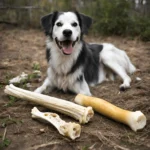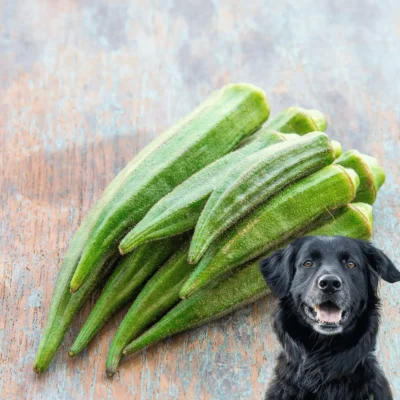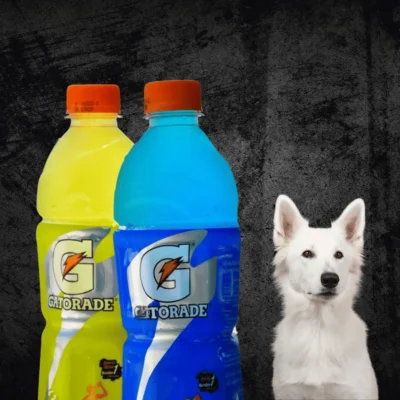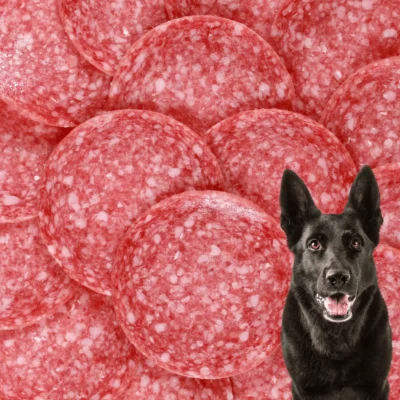Quail eggs have gained popularity as a nutritious and flavorful addition to human diets, but what about our furry friends? Their tiny size makes them ideal for canine consumption. The question arises: can dogs eat quail eggs? Pet parents, If you’re searching for nutritious snacks for your furry friends, quail eggs are the perfect addition to your dog’s diet. Join us as we delve into the compatibility of this healthy delight for your canine companion.
In this article, we will explore the safety of feeding quail eggs to dogs. We’ll delve into the potential benefits of incorporating quail eggs into a canine diet, and we’ll also discuss the proper ways to introduce and feed quail eggs to your furry friend.
Here are the topics we’re going to discuss in this blog post:
- What are quail eggs?
- Are quail eggs safe for dogs?
- Benefits of quail eggs for dogs
- How to feed quail eggs to dogs
- Can dogs eat boiled quail eggs?
- Can I Feed My Dog Raw Quail Eggs?
- Can dogs eat quail eggshells?
- Do quail eggs contain salmonella?
- How many quail eggs can a dog eat?
What are Quail Eggs?
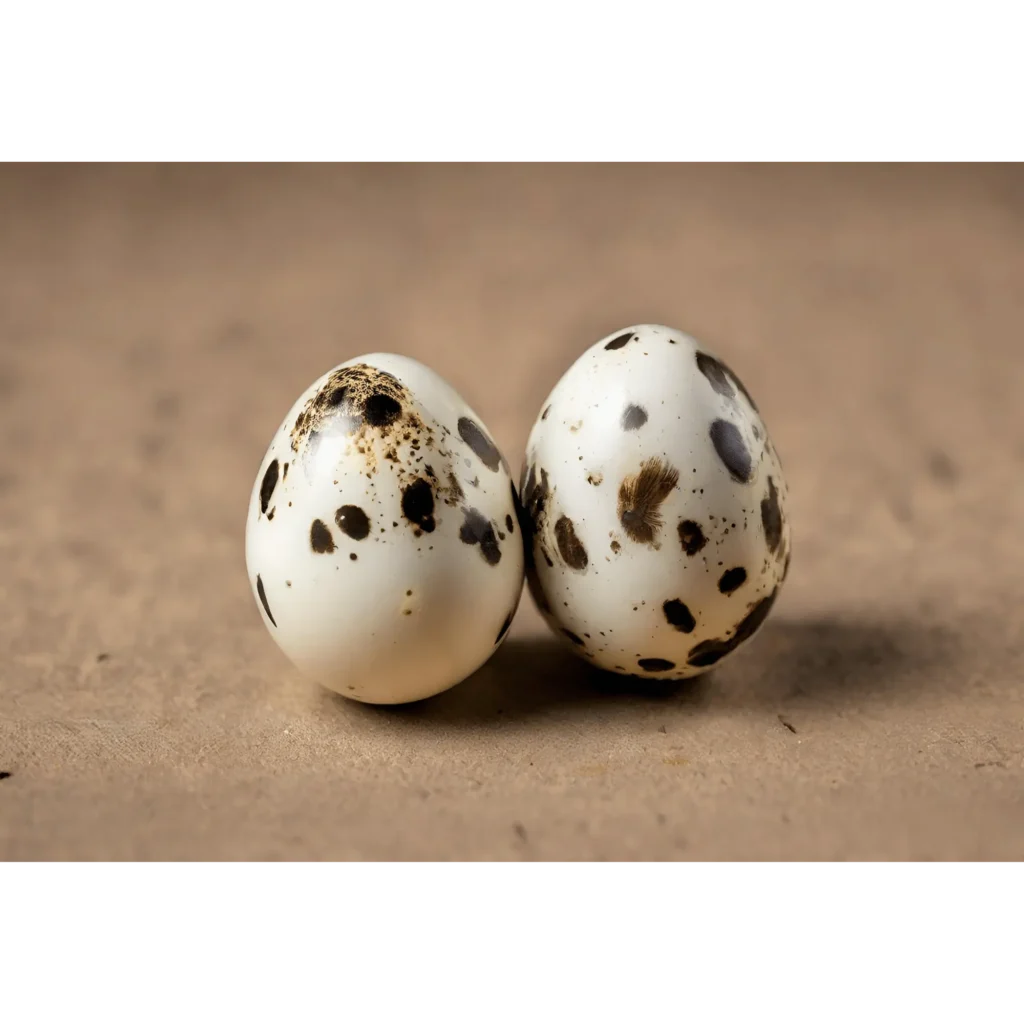
Quail eggs are notably smaller than chicken eggs, averaging about one-third of the size of their larger counterparts. Their distinctive speckled shells come in various colors, including shades of brown, blue, and white. These eggs are particularly popular in certain cuisines, with a significant presence in Asian countries like Japan and China, as well as in European and Middle Eastern culinary traditions.
Flinch eggs are known for their rich, creamy taste and slightly stronger flavor compared to chicken eggs. From a nutritional perspective, quail eggs are a valuable source of protein, healthy fats, and essential vitamins such as B12 and riboflavin. They also contain important minerals like iron and zinc. Additionally, quail eggs are a good source of choline, a crucial nutrient for maintaining brain health.
Nutritional information:
In terms of nutritional content, a single quail egg, weighing around 9 grams, contains the following:
- Protein: 1 gram
- Fat: 1 gram
- Carbs: 0 grams
- Fiber: 0 grams
- Choline: 4% of the Daily Value (DV)
- Riboflavin: 6% of the DV
- Folate: 2% of the DV
- Pantothenic acid: 3% of the DV
- Vitamin A: 2% of the DV
- Vitamin B12: 6% of the DV
- Iron: 2% of the DV
- Phosphorus: 2% of the DV
- Selenium: 5% of the DV made it flow
Are Quail Eggs Safe for Dogs?
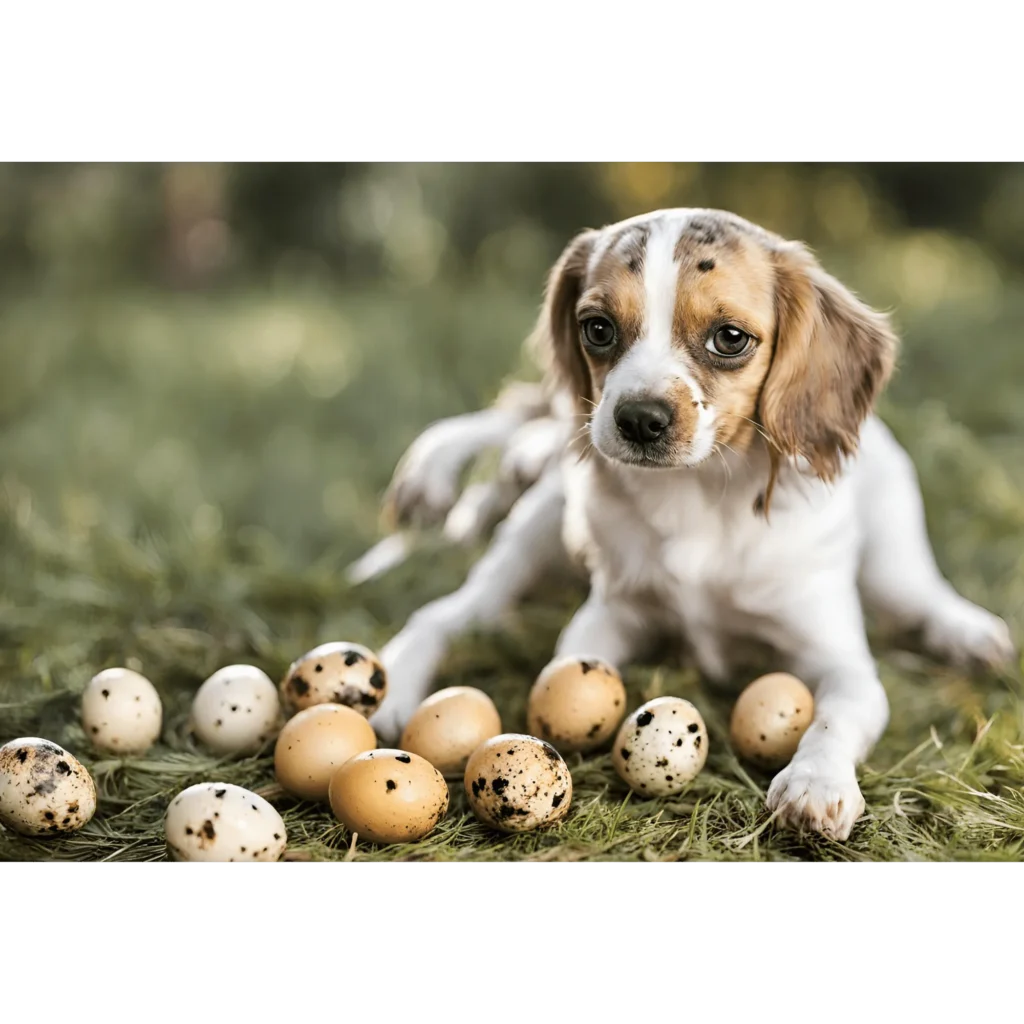
The short answer is yes; quail eggs are safe for dogs in moderation. They are rich in protein, vitamins, and minerals, and they can be a healthy addition to a balanced canine diet. Quail eggs offer health advantages comparable to duck eggs, and they can be even more beneficial for your dog than quail meat itself. Despite their small size, quail eggs serve as an excellent alternative to traditional chicken eggs.
While blench eggs can be a nutritious addition to a dog’s diet, it’s vital to offer them in moderation. Too much of any new food can induce a digestive upset. As with any treat or supplement, quail eggs should be part of a balanced and complete diet.
Benefits of Quail Eggs for Dogs:
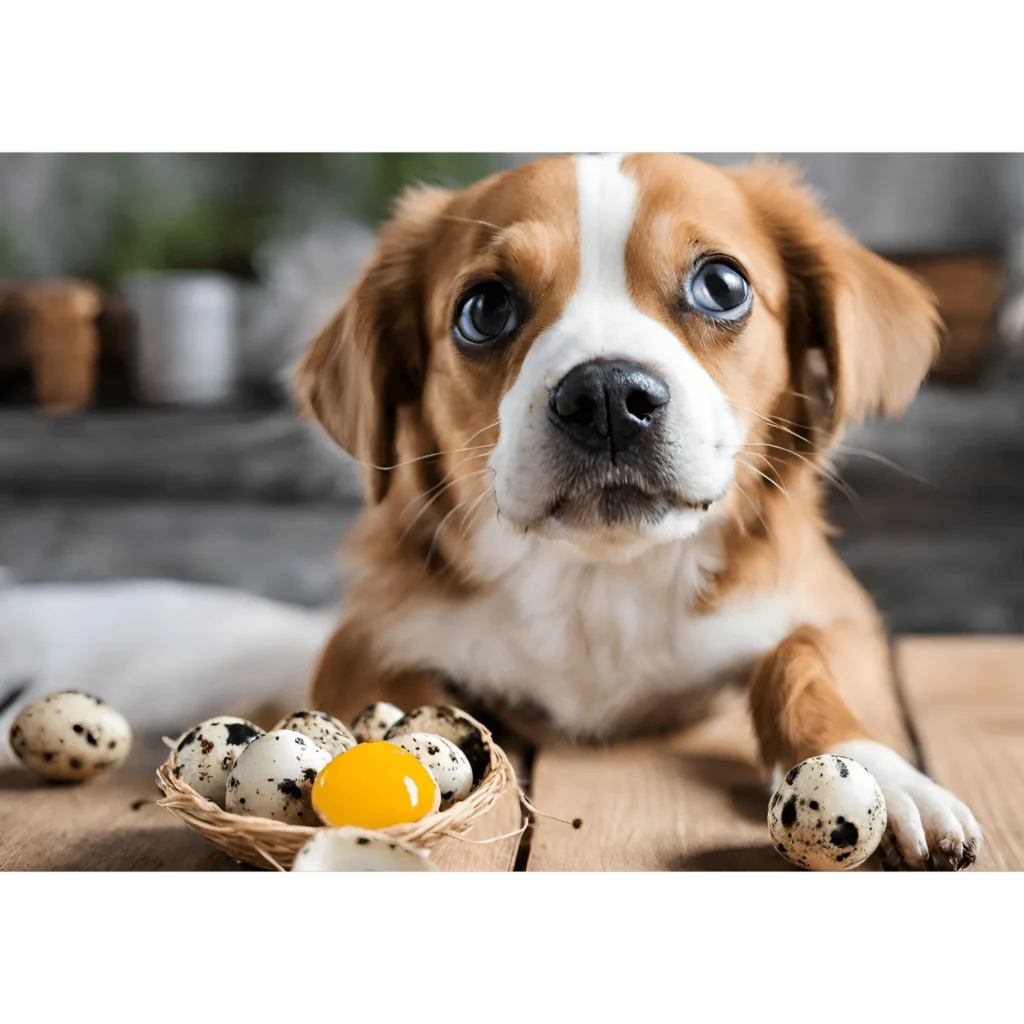
Quail eggs can offer various potential benefits for dogs when incorporated into their diet in moderation. Here are some potential perks of quail eggs for dogs:
Rich in Nutrients:
Yes, the richness of nutrients is one of the key advantages of incorporating quail eggs into a dog’s diet. Quail eggs are packed with a variety of essential nutrients that contribute to overall health and well-being.
Quail eggs are a good source of essential nutrients, including protein, vitamins, and minerals. They contain various vitamins, including vitamin A, vitamin B2 (riboflavin), and vitamin B12. These vitamins play essential roles in maintaining healthy skin, promoting good vision, supporting energy metabolism, and contributing to overall immune function.
High-Quality Protein:
The protein in quail eggs is of high quality and easily digestible. It is essential for the growth and maintenance of muscle tissue. Dogs, being active animals, need an adequate protein intake to support their muscle development and overall physical fitness.
The protein in quail eggs is easily digestible, allowing for optimal nutrient absorption. This is especially important for dogs with sensitive digestive systems or those with specific dietary requirements.
Amino Acids:
Amino acids are vital for the development and maintenance of muscle tissue. As dogs are active animals, having an adequate supply of amino acids supports their muscle growth, strength, and overall physical fitness.
Amino acids, particularly those with sulfur content like cysteine and methionine, contribute to the health of the skin and coat. Certain amino acids play a role in supporting the immune system. A healthy immune system is essential for protecting dogs from infections and diseases.
Fatty Acids:
Quail eggs, like many other types of eggs, contain omega-3 fatty acids. Omega-3s, such as eicosapentaenoic acid (EPA) and docosahexaenoic acid (DHA), have anti-inflammatory properties. These fatty acids are known to support various aspects of canine health, including reducing inflammation associated with conditions like arthritis.
Omega-3 fatty acids, especially DHA, are crucial for brain health and cognitive function. These acids have been associated with cardiovascular health. They may help maintain normal heart function and reduce the risk of certain heart-related conditions.
Vitamins and Minerals:
Quail eggs contain a variety of vitamins and minerals that can contribute to a dog’s overall health when incorporated into their diet. Vitamin A plays a role in maintaining the health of the eyes, skin, and mucous membranes. Vitamin B is essential for energy metabolism and the maintenance of healthy skin, eyes, and nerve functions.
An antioxidant mineral that aids and supports the immune system and helps protect cells from damage. Minerals are important for the formation and maintenance of healthy bones and teeth. It is also connected with energy metabolism.
How to Feed Quail Eggs to Dogs:
Feeding quail eggs to your dog can be a nutritious and tasty addition to their diet, but it’s essential to do so in moderation and with certain precautions. If your dog has never had quail eggs before, introduce them gradually to avoid digestive upset. Start with a small amount and observe how your dog reacts before incorporating more into their diet.
It’s generally recommended to cook the quail eggs before feeding them to your dog. Boiling or scrambling the eggs is a common method. Some dogs are perhaps allergic to eggs, including quail eggs. Watch for any signs of allergies or sensitivities, such as itching, redness, digestive upset, or changes in behaviour. If you notice any adverse reactions, discontinue feeding quail eggs and consult with your veterinarian.
Can Dogs Eat Boiled Quail Eggs?
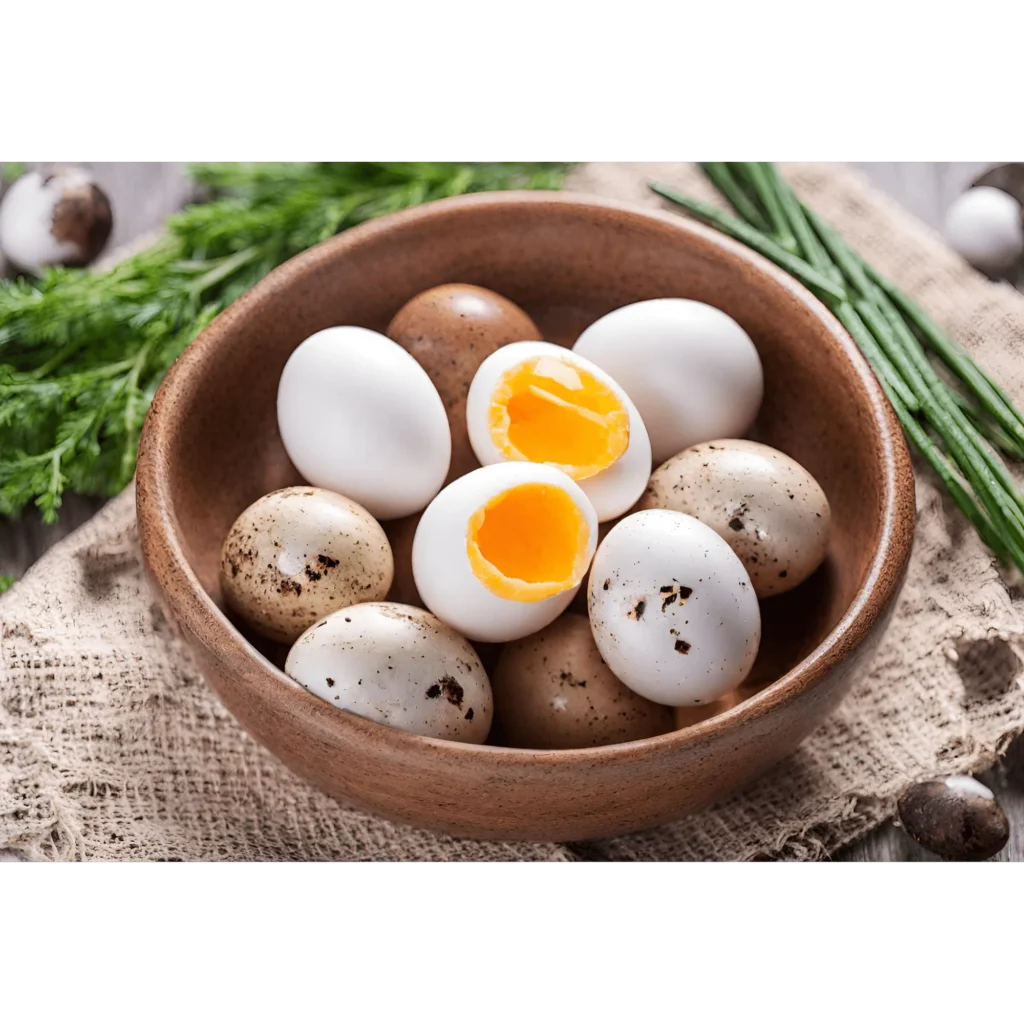
Yes, hard-boiled eggs can be a delightful treat for your furry friend, offering not only a tasty indulgence but also essential vitamins that promote healthy skin. With their rich content of vital vitamins, hard-boiled eggs become more than just a tasty snack—they become a wholesome addition to your pup’s diet, supporting their skin health and adding a delightful touch to their culinary experiences.
To prepare them for your canine companion, boil the eggs until both the white and yolk are fully cooked, usually for about 3-4 minutes. Consider your dog’s size when determining portion sizes, offering them as a special treat or meal topper.
Can I Feed My Dog Raw Quail Eggs?

Certainly! When it comes to feeding your dog raw quail eggs, you have options. You can give them the whole egg or crack it open for them, shell and all, as both parts offer health benefits.
If you choose the raw route, remember to handle the eggs safely. Wash your hands thoroughly afterwards, and keep the eggs refrigerated until mealtime. Keep an eye on your dog for any signs of discomfort, like vomiting or diarrhea. Before making raw quail eggs a regular part of your dog’s diet, it’s a good idea to chat with your veterinarian to make sure it’s a healthy choice for your furry friend.
Can Dogs Eat Quail Egg Shells?
Yes, you can offer the whole unshelled quail egg to your dog without any concerns. Dogs can safely eat the egg with its shell intact, as their stomachs are capable of digesting the shells without causing any problems. There’s no need to worry about an upset stomach or choking hazards. It’s a hassle-free and safe way to include quail eggs in your dog’s diet.
Do Quail Eggs Contain Salmonella?
When it comes to eggs, Salmonella is often a concern. However, quail eggs typically don’t pose the same risk as chicken eggs. The higher body temperature of quails compared to chickens means that Salmonella is less likely to be transmitted to quail eggs. This natural difference in body temperature reduces the likelihood of bacterial contamination, making quail eggs a safer option in this regard.
If you have specific concerns about feeding quail eggs to your dog, or if your dog has a compromised immune system or other health issues, it’s advisable to consult with your veterinarian for personalized advice.
How Many Quail Eggs Can a Dog Eat?

Quail eggs are rich in calcium, so it’s essential not to overfeed them to your dogs. The suitable serving size depends on your dog’s size and nutritional requirements. As a general guideline, small dogs can safely enjoy up to one quail egg per day, while larger dogs can have up to two. This helps maintain a balanced intake of nutrients without exceeding their dietary needs.
Final Thought:
In conclusion, quail eggs can be a wholesome and nutritious addition to your dog’s diet when fed in moderation. Packed with essential nutrients such as high-quality protein, amino acids, fatty acids, vitamins, and minerals, these tiny eggs offer a range of potential health benefits for your canine companion. Whether boiled or served raw, quail eggs can be a delightful treat, supporting skin health, muscle development, and overall well-being.
It’s crucial, however, to introduce quail eggs gradually and monitor your dog for any signs of allergies or sensitivities. Cooking the eggs is generally recommended, and feeding them with the shell intact poses no harm to your dog’s digestive system. Additionally, the risk of Salmonella contamination in quail eggs is relatively low compared to chicken eggs, making them a safer option.
Remember that moderation is key, especially considering the rich calcium content in blench eggs. Small dogs can typically enjoy up to one quail egg per day, while larger dogs can safely have up to two, ensuring a balanced nutrient intake without exceeding their dietary needs. As always, consult with your veterinarian to tailor your dog’s diet to their requirements and to address any specific health concerns.
FAQs:
Are quail eggs safe for dogs to consume?
Yes, quail eggs are generally safe for dogs and can be a nutritious addition to their diet when given in moderation.
What nutritional benefits do quail eggs offer to dogs?
Quail eggs are rich in protein, vitamins, and minerals. They contain essential nutrients such as vitamin B12, riboflavin, and selenium, which contribute to overall canine health.
Where can I find quail eggs for my dog?
Quail eggs can be found in some grocery stores, farmers’ markets, or specialty food stores. Ensure the eggs are fresh and sourced from reliable suppliers.
Are there any potential allergic reactions to quail eggs in dogs?
While allergies to quail eggs are rare, it’s crucial to monitor your dog for any adverse reactions after introducing them to the diet. Signs of allergies may include itching, vomiting, or diarrhea. If any such symptoms occur, consult your veterinarian.
How should quail eggs be prepared for dogs?
Quail eggs can be fed raw or cooked. It’s recommended to start with a small amount to ensure your dog tolerates them well. Raw eggs should be fresh and sourced from reputable suppliers to minimize the risk of contamination.








